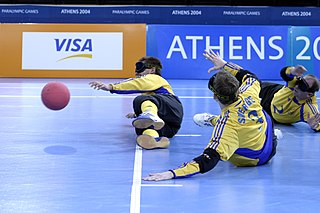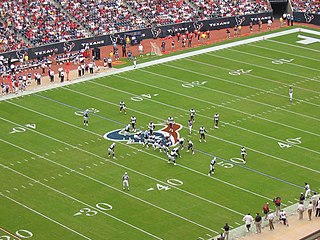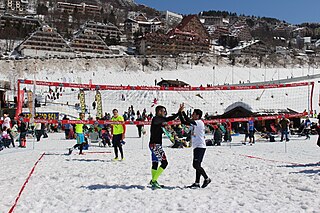
A referee is an official, in a variety of sports and competition, responsible for enforcing the rules of the sport, including sportsmanship decisions such as ejection. The official tasked with this job may be known by a variety of other titles depending on the sport, including umpire, judge, arbiter (chess), commissaire, or technical official. Referees may be assisted by umpires, linesmen, timekeepers, touch judges, or video review officials.

Coin flipping, coin tossing, or heads or tails is the practice of throwing a coin in the air and checking which side is showing when it lands, in order to randomly choose between two alternatives, heads or tails, sometimes used to resolve a dispute between two parties. It is a form of sortition which inherently has two possible outcomes. The party who calls the side that is facing up when the coin lands wins.

The team captain of a football/soccer team, sometimes known as the skipper, is a team member chosen to be the on-pitch leader of the team; they are often one of the older or more experienced members of the squad, or a player that can heavily influence a game or has good leadership qualities. The team captain is usually identified by the wearing of an armband.

The captain of a cricket team, often referred to as the skipper, is the appointed leader, having several additional roles and responsibilities over and above those of the other players. As in other sports, the captain is usually experienced and has good communication skills, and is likely to be one of the most regular members of the team, as the captain is responsible for the team selection. Before the game the captains toss for innings. During the match the captain decides the team's batting order, who will bowl each over, and where each fielder will be positioned. While the captain has the final say, decisions are often collaborative. A captain's knowledge of the complexities of cricket strategy and tactics, and shrewdness in the field, may contribute significantly to the team's success.

In cricket, the toss is the flipping of a coin to determine which captain will have the right to choose whether their team will bat or field at the start of the match.

Goalball is a team sport designed specifically for athletes with a vision impairment. Participants compete in teams of three, and try to throw a ball that has bells embedded inside of it into the opponents' goal. The ball is thrown by hand and never kicked. Using ear-hand coordination, originating as a rehabilitation exercise, the sport has no able-bodied equivalent. Able-bodied athletes are also blindfolded when playing this sport.

Gameplay in American football consists of a series of downs, individual plays of short duration, outside of which the ball is or is not in play. These can be plays from scrimmage – passes, runs, punts or field goal attempts – or free kicks such as kickoffs and fair catch kicks. Substitutions can be made between downs, which allows for a great deal of specialization as coaches choose the players best suited for each particular situation. During a play, each team should have no more than 11 players on the field, and each of them has specific tasks assigned for that specific play.

Sports equipment, sporting equipment, also called as sporting goods, are the tools, materials, apparel, and gear used to compete in a sport and varies depending on the sport. The equipment ranges from balls, nets, and protective gear like helmets. Sporting equipment can be used as protective gear or a tool used to help the athletes play the sport. Over time, sporting equipment has evolved because sports have started to require more protective gear to prevent injuries. Sporting equipment may be found in any department store or specific sporting equipment shops.

In sports, an ejection is the removal of a participant from a contest due to a violation of the sport's rules. The exact violations that lead to an ejection vary depending upon the sport, but common causes for ejection include unsportsmanlike conduct, violent acts against another participant that are beyond the sport's generally accepted standards for such acts, abuse against officials, violations of the sport's rules that the contest official deems to be egregious, or the use of an illegal substance to better a player's game. Most sports have provisions that allow players to be ejected, and many allow for the ejection of coaches, managers, or other non-playing personnel. In sports that use penalty cards, a red card is often used to signal dismissals. In some sports, another player is permitted to enter the game in place of the player who has been ejected, but in others the team is required to continue the game with a reduced number of players.
A substitute in the sport of cricket is a replacement player that the umpires allow when a player has been injured or become ill, after the nomination of the players at the start of the game. The rules for substitutes appear in Law 24 of the Laws of Cricket.
In games and sport, a tiebreaker or tiebreak is used to determine a winner from among players or teams when their scores are tied at the end of a contest, or a set of contests.

Penalty cards are used in many sports as a means of warning, reprimanding or penalising a player, coach or team official. Penalty cards are most commonly used by referees or umpires to indicate that a player has committed an offence. The official will hold the card above their head while looking or pointing toward the player who has committed the offence. This action makes the decision clear to all players, as well as spectators and other officials in a manner that is language-neutral. The colour or shape of the card used by the official indicates the type or seriousness of the offence and the level of punishment that is to be applied. Yellow and red cards are the most common, typically indicating, respectively, cautions and dismissals.

Unsportsmanlike conduct is a foul or offense in many sports that violates the sport's generally accepted rules of sportsmanship and participant conduct. Examples include verbal abuse, taunting of an opponent or a game official, an excessive celebration following a significant play, or feigning injury. The official rules of many sports include a general provision whereby participants or an entire team may be penalized or otherwise sanctioned for unsportsmanlike conduct.

A captain of an Australian rules football team, sometimes known as a skipper, is a player who, during the course of a match and off the field, has several additional roles and responsibilities over and above those of a regular player.
In team sports, substitution is replacing one player with another during a match. Substitute players that are not in the starting lineup reside on the bench and are available to substitute for a starter. Later in the match, that substitute may be substituted for by another substitute or by a starter who is currently on the bench.

Rugby league match officials are responsible for fairly enforcing the Laws of the Game from a neutral point of view during a match of rugby league football and imposing penalties for deliberate breaches of these Laws. The most senior match official is the referee. They may be assisted by a range of other officials depending on the level and rules of the competition.

Cricket is a bat-and-ball game played between two teams of eleven players on a field at the centre of which is a 22-yard (20-metre) pitch with a wicket at each end, each comprising two bails balanced on three stumps. Two players from the batting team stand in front of either wicket, with one player from the fielding team bowling the ball towards the striker's wicket from the opposite end of the pitch. The striker's goal is to hit the bowled ball and then switch places with the nonstriker, with the batting team scoring one run for each exchange. Runs are also scored when the ball reaches or crosses the boundary of the field or when the ball is bowled illegally.

Rugby union match officials are responsible for enforcing the laws of rugby union during a match. "Every match is under the control of match officials who consist of the referee and two touch judges or assistant referees." Further officials can be authorised depending on the level and form of the game.
Touch match officials are responsible for fairly enforcing the Playing Rules of Touch during a match and imposing penalties for deliberate breaches of these rules. The most senior match official is the referee, they may be assisted by a range of other officials depending on the level and rules of the competition.

Snow volleyball is a winter team sport played by two teams of three players on a snow court divided by a net. The objective of each team is to score points by sending a ball over the net so as to ground it on the opponent's court, and to prevent the same effort by the opponent. A team is allowed up to three touches to return the ball across the net, and individual players may not touch the ball twice consecutively.

















